Empathy
by Adnan Khan
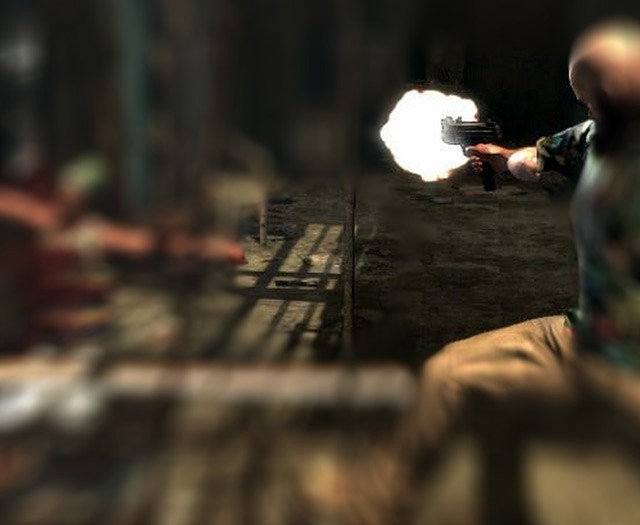
“I only understood a little, but things were not going well.” — Max Payne
The first weird thing that happened to me in South Korea was when I was doing a favorite thing: sitting in my boxers, eating pistachios. I was in front of my computer talking to a friend from home when someone knocked on my door. This was unusual. I’d only just moved to Korea to teach English and no one knew where I lived and no one had any reason to visit. Reasons for others to intrude into your life accumulate without your awareness all the time, and in strolled five police officers clad in black track suits.
One of them cradled my arm. They didn’t speak English. They said one thing, over and over, ‘Passport! Passport! Passport!’ and I struggled, panicking, to locate my passport. It wasn’t where it usually was. The adrenaline rush that accompanied five police officers surrounding me made me forget that I had brought it out earlier to fill out paperwork and so it was in the jeans slung on the back of my chair and not tucked away in its drawer. They waited patiently while I collected myself. I asked them a few questions: Who are you? Why are you here? Can I see a badge? They answered none, I guess because they couldn’t understand a word I was saying. I had the passport. They flipped it open to the page of my visa, read it, and were satisfied.
They tried to leave but I held one in my grasp — convinced now that I was legally invited, they turned gentle; these officers, certainly weirded about my presence in their monoculture country, my chest hair peeking from the V collar of my sweatshirt — that I almost didn’t feel scared and I tried to get him to explain. He didn’t have enough English and so he scribbled down a phone number for me to contact.
The next morning a second weird thing happened while I was doing a least favorite thing: walking to work too early in the morning. The sun was only just sliding out to start the day. While waiting to cross the street to school a maroon minivan pulled in front of me and the door slid open. I was eating a 7–11 burger for breakfast. It was disgusting. A middle aged lady appeared, looked me straight in the eye, and shouted at me with an incredible 7 a.m. glee: “I love you!” — and then she slid the door shut and drove away.
I told my high school boys about the police, not sure what to expect — easy sympathy, or apathy? The boys were sympathetic but the teacher who shared the class with me laughed out loud and brushed his open palm over my cheeks and said, ‘It’s because of your face!’ He moved the lesson along quickly. I didn’t know why I had told the class. They didn’t have enough English to glean anything real from it, and I had no Korean to try to explain. It was a weird anecdote. I gave another co-worker the phone number later and he found out that a neighbor had called the police on me, suspecting that I was an illegal immigrant. Why? Because they just did. Because everyone around me was Korean, I wasn’t, and there were Sri Lankan migrants in the area, some who may have been illegal. No one knew. I’m not Sri Lankan, I said. He shrugged.

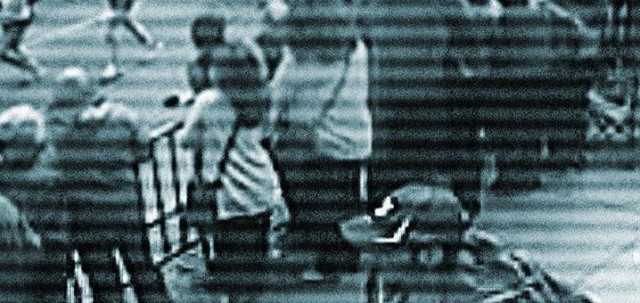
The Gwangju Biennale came by every two years and 2010 was the lucky year. Being confronted daily with the fact I wasn’t Korean was whittling me down and I wanted to see a bit of the world. Thomas Hirschhorn’s Embedded Fetish was there and instead of calming me down, it rattled me inside and out. It contains a collection of photographs of men that had died in the War on Terror. These were close ups, sometimes heavily pixelated, but still, the aura of their pain was obvious in the room, multiplied, over and over again. Already strung out, I wasn’t really ready for the magnified effect the photos would have on me. There were also busts that had screws and bolts jutting out of them to show the impact point as depicted in the photographs, to draw out in visceral detail the suffering that these men had gone through.
My parents have always been reticent to talk about their history, but I had recently managed to learn that my paternal Grandfather was a Pashtun Afghani orphan and so in both an abstract and biological way, I was quite heftily Afghani. I felt claustrophobic and left. Immediately outside I walked into a group of 100 middle school students who could not believe their luck at seeing a brown, bearded man in the middle of the city. They screamed and screamed until I walked away and discovered a bizarre Turkish donair stand, and chewed slowly, examining the odd wobbliness I felt.
Physical recognition can be the first step towards empathy or its opposite. Understanding is preceded by a desire to understand: you have to want to care to care. It was always easy for me to be against the wars in the Middle East, but knowing that I was Afghani and discovering those photographs was too much — I couldn’t stand.
The Boston Marathon bombings reminded me of this murkiness. These kinds of events were apparently now only possible from people on “the inside,” committed by “normal college students,” and even more frustratingly, from people who fell under the large swath of “people like me”: immigrants. Dzhokar arrived in the U.S. at 8, I entered Canada almost 7, having forgotten the purple scarf my mother got for me on the plane. Where did my mother find a scarf in Saudi Arabia? Seung-Hui Cho, the Virginia Tech shooter, arrived from South Korea at 8. One Goh, the school shooter in Oakland, arrived later in life, older, and closer to being fully formed.

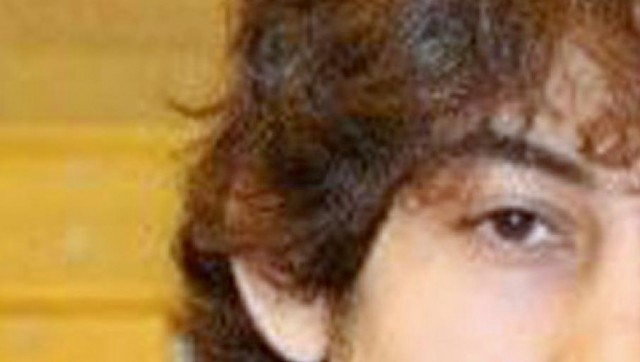
Jay Caspian Kang recalled meeting One Goh in 2012. He visited the shooter in prison and they quickly discovering a mutual connection.
He said, ‘You know, my father is a pretty typical Korean guy.’ I told him I knew what that meant. There’s a shorthand among Korean immigrants, and as I sat across from One Goh, I tried not to think about the ease with which we had connected.
Kang later reveals sharing the same type of heart-dropping feeling many “dark skinned males” felt when the Boston marathon bombing happened when he heard about One Goh:
I learned about the Oikos shooting shortly after it happened from a Korean friend who communicated the whole thing in a one-line e-mail: “We did it again.” I knew what he was talking about the moment I read it. “We,” indeed, had done “it” again, and “it” required no further explanation.
Kang’s article was actually the first I’d heard of the Oikos shooting, from here outside America. Kang wrote: “The victims of the Oikos massacre came from Korean, Indian, Tibetan, Nigerian, Filipino and Guyanese backgrounds.” Their lack of wealth, success and any visibility at all meant that “they were not held up as beacons for the possibilities of immigration, nor were they the faces of urban decay and the need for government assistance and intervention. They did not exist within any politicized realm.”
My Facebook feed did break the news of the Boston bombings to me, but instead of the horror and bravado that usually greeted past attacks on America, this was different. Friends were posting links to a bombing in Iraq that occurred on the same day and that had killed more people, and the status updates were tender: “This happens every day to others” was the general theme.
What does it take to start feeling for others? Each Facebook post reflected a sort of anger — and they were all from white people — at the havoc that was regularly visited upon the rest of the world. Photographs that were blurred or not shown on TV squirm onto the Internet; these were some of the top links on Reddit. To these people, the Boston marathon photographs resembled the Middle East’s war photographs. Photographs of white men in the U.S. in tracksuits with their legs blown off from bombs containing ball bearings. This may have been the bombers’ point. Forced to see the West like the East, would that be enough to cause reflection? Is that simple or garish? Do we need to see someone harmed to empathize?
The Tsarnaev brothers were building up towards being indistinguishable. The most confrontational of the photos of them show the older brother as a boxer, training in America, hoping to ascend from himself, but still stuck in a type of alienation. (“I don’t have a single American friend.”) A photograph of Tamerlan doing a bizarre ankle strengthening exercise and laughing because Americans don’t worry about their ankles; a quote from a coach who admired his strong European boxing stance. The Rolling Stone cover with Dzhokhar, looking like any kid’s selfie, because he did a better job of becoming American then his brother did.
“You know how vampires have no reflections in the mirror?” Junot Diaz once rhetorically asked an audience. “If you want to make a human being a monster, deny them, at the cultural level, any reflection of themselves.” What was being reflected toward us?
“Nobody in Temescal’s Koreatown wanted to talk about Koreanness and One Goh,” Kang found. They did not want to draw attention to Koreans, or Koreanness. Mosques, too, are the first to distance themselves from crazy people who murder and who look like they might be Muslim.
But the community Kang is speaking to can’t no-comment forever, especially if this happens again. Eventually, others will fill the need for discussion, as Martin Amis did for Muslims in 2006, expounding on an “urge”: “The Muslim community will have to suffer until it gets its house in order,” Amis felt compelled to say, detailing his desire to prohibit Muslims from traveling and other “discriminatory stuff, until it hurts the whole community and they start getting tough with their children.” Mosques now answer the question before being prompted, generally issuing “This is not what Islam is” statements when an atrocity occurs. Bill Cosby’s approach looms long after the Trayvon Martin disaster, where the black community gets denied the force of American history and instead told to pull their pants up.
The other popular set of images of Tamerlan is him lying on the autopsy table, his guts seemingly evacuated from his body, gashes covering his frame. “Who expected Chechens?” was one of the first updates on my news feed when the identities of the bombers was revealed. I had been worried about empathy since right after the bombing, when I read that the males were considered “dark skinned.”
Is it empathy I’m looking for? I have a shimmering sensation of both being here and not being here that I’m looking to conquer. Maybe that’s said of anyone who realizes the tender fabric we build ourselves up with. This mischievous pain that so many of us feel, that Kang, Diaz, and hundreds of others try to illuminate, but always seems to remain forever outside the reach of the sliding sun, can that really be vanquished?


Last year in Kill Screen, Filipe Salgado argued that the video game Max Payne 3 turns us all into “ugly Americans.”
Max is ushered from the richest VIP clubs in São Paulo to the poorest slums, and even he comments on not understanding how one really connects to the other. It’s something Rockstar’s script keeps coming back to, his inability and unwillingness to comprehend the complex socio-economic relationships in Brazil’s major cities. Max shoots first, and doesn’t bother to ask many questions later.
This is on purpose, Salgado suggests, as none of the Portuguese dialogue in the game is translated. You are not meant to bridge the gap between Max and the scenery.
“MP3” is lavishly designed. Furious colors and crisp noir dialogue guide your progress. The controller vibrates whenever you shoot your gun. You never know what anyone is saying to you because they are a foreign enemy. It’s an intense experience during which I took several week-long breaks; the constant violence is too much.
Salgado’s apprehension is this depiction of Brazilians as faceless targets. The game rips through our popular comprehension of Brazil. Money, thugs, slums. It’s only after at least 10 hours of game play that I remember Salgado’s argument and realize that at no point I saw a problem with blasting away hoards of Brazilians.
I do avoid any video games that I think might be set in Afghanistan or Iraq. The other day, while waiting tables, I got silently and rapidly very angry at the band British India for choosing such a goofy name. I get mad when Wes Anderson writes an Indian character, or at any Muslim terrorist character on “Homeland.” But this was easy — I just wanted to shoot people. Where was my empathy? Emotional, intellectual, or otherwise? When is fun fun? Why can’t British India just be a band?
When I play NHL 2011, I play as my hometown team, the Toronto Maple Leafs. Ice hockey is an overwhelmingly white sport and the Toronto Maple Leafs have the highest drafted Muslim player in the league, Nazem Kadri. This led the way for me creating my own “dark-skinned” team, beginning with Kadri and including Ray Emery, Wayne Simmonds, Johnny Odyua, Manny Maholtra and PK Subban. I inspect the rosters of other teams for dark faces. I had friends growing up who would search the NBA’s payrolls to add white faces to their video game basketball teams; the short kids sought out Muggsy Bogues and Damon “Mighty Mouse” Stoudamire. My own roster patrolling started in Korea, when I wanted to act on a craving to witness a representation of something “like” me. It was that weird elastic loneliness of wanting to be alone — why else travel? — and not wanting to be alone — how does one wrangle longing? — that manifested itself in that intermediate state: A video game. Where else would I get it?
There’s an interesting loneliness that comes with having no reflections. I want to think that the closest I’ve found is Kumar from the Harold and Kumar movie franchise; n+1 recently suggested Kumar might be the “single best role model for generations of brown people otherwise condemned to going pre-med.” But how flat is his rendering? How desperate is my desire that I fling everything on to poor Kal Penn? I treat Kumar with the same sort of reverence that someone could treat a Max Payne. Why am I so eager for the immigrant Dude, Where’s My Car? I hold “Grand Theft Auto IV” — about a Serbian immigrant — strangely close to my heart, pumping the narrative full of meaning that was probably not intended.
The uselessness of brown angst. What am I supposed to do with all this scaffolding of thought that I’ve built? All these sputtering images, do they place any of us in the world? This color of pain gets brighter and more opaque with age, into something that I notice more but am less sure what to do with.
At the restaurant I work at, now in Melbourne, I recently seated an old couple. She had a perm and bright red lipstick, he had a gold ring, a red sweater. He ordered a drink. “Where are you from?” he asked, after noticing my accent, my skin. His hair was slicked back but I could see that he’s a bit bald. “Canada,” I said. I’m awful at pouring wine; nervous, too slow. It dribbles from the bottle. I found out later that he’s a popular local columnist. “Oh good,” he said. They were staring at each other, still in love. “At least you’re not a Muslim.”
Adnan Khan currently lives in Melbourne, Australia.
New York City, August 14, 2013

★★★★★ The umbrella outside the door lay there like an artifact from an improbable other plane of reality. Starbursts of light flashed from the temples of a couple’s sunglasses; the air smelled of ineffable renewal, part freshly cleaned laundry and part new plant growth. The hem of a long dress billowed. Somewhere, no doubt, some humorless fanatic was composing a refutation of global warming. Previously unnoticed signage took on meaning. Print a shirt? Why not print a shirt? Iced milk tea rose through the straw and minor ambitions multiplied: things to do, create, clean, solve. Everything seemed feasible. The hours spent working indoors felt like a tragic error. On the uptown platform, a man in a blue Derek Jeter jersey clutched a brown-bagged bottle as he waited for the stadium-bound train. Orange light got in among the pipes below a water tower as the sun traced its smooth descent, cloudless save a decorative line of little purple ones off to the north.
Sleeping Driver Just As Competent As Everyone Else On The Road
“A woman from New Zealand drove almost 200 miles while asleep at the wheel and even sent text messages from her mobile phone.”
German Terror Turtle Still At Large

“Even at night, the Bavarian village of Irsee isn’t able to settle down. The town’s mayor, Andreas Lieb, was at the nearby lake Oggenrieder Weiher on Tuesday evening when he came across four people busily working away in the darkness. Lieb promptly asked the unwanted guests to leave. ‘They were pros,’ says Lieb, adding that they were equipped with high-powered flashlights and protective clothing. The night-time visitors were attracted to the lake due to an incident that occurred there last week: An eight-year-old boy’s Achilles tendon was severed while playing in the water — and experts believe that the injury was caused by an alligator snapping turtle.”
— It remains on the loose! Above, the only known photo of the beast.
The Ballet, "Is Anybody Out There?"
So I am kind of late to this one, but after repeatedly hearing comparisons to Hidden Cameras and the Magnetic Fields I figured I’d give it a try. I for sure hear the Magnetic Fields similarity, particularly to the earlier stuff (remember, I was one of the first people ever to realize that the Magnetic Fields were good back during their early years). This video has apparently been around for a while, but the album from which it springs just came out at the beginning of the summer, and if you like this and want to hear more that seems as good a place as any to start.
What Citi Bike Is Like
“You know it’s not good for you. But it’s going to be around on the weekends.”
— Citi Bike compared to a bad romance.
How Your Book About Books Gets Made: Boris Kachka Tells All About "Hothouse"
by Evan Hughes
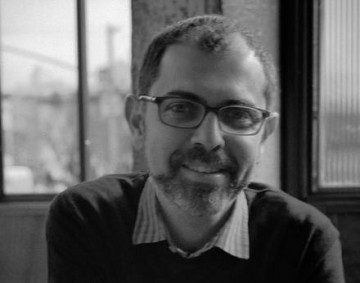
In Benjamin Anastas’s 2012 memoir, Too Good to Be True, he writes of how he viewed Farrar, Straus and Giroux when he was an unpublished writer “prone to bouts of romantic longing”: “It was not just a publisher in my eyes. It was more like the Promised Land.” A poet who had caught a glimpse of the office had once told him on a fire escape in Queens, “National Book Awards? They paper the fucking place. It’s like a shrine in there. You whisper.”
A certain mystique, whether you buy it or not, surrounds FSG, publisher of 25 Nobel laureates since its first slate of titles appeared in 1946. Boris Kachka’s Hothouse is a history of the publishing house that gives a long look behind the curtain. The book also functions as a biography of Roger Straus (1917–2004), the charismatic, egotistical, and crude product of a union of two powerful Jewish families who founded FSG and led it for nearly six decades. He finally ceded to the industry trend toward consolidation in 1994, selling a majority stake to the Georg von Holtzbrinck Publishing Group, but he retained a degree of independence for himself and his successors. In Hothouse, Kachka provides a tour of postwar intellectual life though the story of one of its eminent and eccentric institutions.
I told Kachka I was looking for some VH1 “Behind the Music” material, some insight into “the making of” the book. (He replied, “You mean how I wrote it in one coke-fueled jag while riding shotgun with Vince Neil cross-country?”) We sat down to talk on a recent Sunday.

The Awl: Why don’t you walk me through the book deal and how it was it that you ended up changing publishers midway through the project.
Boris: A small house picked up the book for $30,000. It was not an easy sell, and in fact [the eventual editor] Jofie Ferrari-Adler was one of the editors who declined to take it on the original proposal. He was at Grove/Atlantic then. Things didn’t work out with Thomas Dunne Books, my original publisher. It was a little awkward to begin with, because Dunne and FSG are both owned by Macmillan, so maybe FSG would get early looks or whatever. The pipeline just felt a little bit…
The Awl: Too short.
Boris: Yes, exactly. And that wasn’t the only issue but let’s leave it at that. Eventually, my agent, Jane Dystel, and I decided to take a chance. We parted ways with Dunne, returned the half-advance I’d gotten, and went out to others. It was easier to do that with a completed book, but it was a risky thing of course. Jofie eventually sent me a note: “This book is marvelous, baby.” He had lots of suggestions and there was some rewriting involved. He matched that first advance. I’m so lucky that I wound up with Jofie [at Simon & Schuster].
The Awl: Why FSG? For instance, why not Knopf, which is often talked about in the book as a kind of rival?
Boris: Well it wouldn’t be the story of an independent company. It would be the story of the most literary imprint in the publishing industry. [Knopf was acquired by Random House in 1960.] That phrase that comes up in the book, “semi-outsiders”; it just resonates in so many ways. FSG published a lot of books that were outside the mainstream system. They didn’t play in auctions, which now sounds ridiculous. [For a sought-after book, an agent will often set up an auction in which publishers bid against one another.] They really didn’t! As almost a blanket policy until, like, 1985.
The Awl: Yeah, how did they get away with that? Just because writers wanted to be there?
Boris: Yeah, I think a lot of them did. And I think a lot of the people they were publishing by the early ’80s were not big-time writers anyway. Their demands were more [laughs] emotional and spiritual than financial. I mean of course that changed, but I think it was the only way they could survive for a while. They also survived by licensing paperback rights. For Scott Turow’s Presumed Innocent they paid $200,000 in the hardcover deal and then made a paperback deal for $670,000.
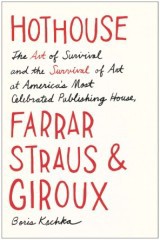
Available almost literally wherever books are sold!
• Powell’s
• Amazon
The Awl: That was pretty sweet.
Boris: Right, I know. But as to the question of why FSG, beyond that there were so many things that appealed to me. To be able to write about New York, and, you know, Jews taking over publishing [laughs], and then the Catholic moment. And this family dynamic between father and son. [Straus’s son, Roger III, did two stints working at FSG, on the understanding that he would take over the company, before leaving over “philosophical differences.”] As I started exploring it as a topic — it was suggested by an agent to me, so it’s not as if I thought, “Oh, let me find the ideal publishing house to write about.” It was, “Is this a good story to follow up on?” And all those elements seemed to come together for me.
The Awl: Was there a golden age for FSG? You rattle off an amazing list for 1968, where you have Joan Didion’s Slouching Towards Bethlehem, Tom Wolfe’s The Electric Kool-Aid Acid Test, a play by Brian Friel, Carlos Fuentes, Robert Lowell, Aleksandr Solzhenitsyn, a collection by Isaac Babel, etc. So is that it, the late 60s?
Boris: Yeah I think it would be around then. That and maybe when Robert Giroux came in and brought all those writers from the late 50s. In both cases I think it comes down to an editor with a vision, who went looking for writers in certain places, and through networks of friends and communities. But in terms of cultural impact, yeah, it has to be the mid- to late-60s. One of the places where I could write a little about not just analyzing a business or writing about people but about a sensibility was in that whole section about Barthelme and Sontag and Wolfe and Didion. Those were very, very different things that they wrote. But all of them were still speaking to a mass audience, but about cataclysmic changes, just as culture was about to splinter.
The Awl: Who were your most valuable sources, in terms of interviews?
Boris: Straus’s son, Roger III, as you can probably tell, was a very useful source. I would hope that I had enough corroboration or disagreement from other people. There’s a risk always to being too sympathetic to one point of view. But it’s astonishing to me, and I think it speaks to his mental health, that he’s able to see many sides of his father’s character so objectively. He helped a lot about his father’s personality. He also helped me take a look at the [Columbia University] oral history [with his father], without which I would have been nowhere for the early years. They were I think 15 distinct interviews.
The Awl: And they’re not public.
Boris: No, you have to get permission from Roger’s son to look at them, to photocopy them, to quote from them. Peggy was also incredibly helpful, Peggy Miller. [Miller was Straus’ “secretary and intimate” for more than four decades, as Kachka puts it.] A delicate situation, but I like to think that I handled it as well as I could without compromising the story.
The Awl: Was there initial resistance from her to talking to you at all?
Boris: I think the resistance came later, when I started getting into stuff she didn’t want to get into. But she’s had a lot of practice deflecting questions.
The Awl: Who else was a valuable source?
Boris: Well, Galassi. [Jonathan Galassi, hired by Straus in 1986, is the current president and publisher of FSG.]
The Awl: What about him in terms of resistance?
Boris: Well he’s going to have his say… Do you know about this? He wrote a review of my book for New York magazine.
The Awl: What? Are you kidding?
Boris: Nope! [mutual laughs]
The Awl: Let’s back up a second. When you first floated the idea, what was his reaction?
Boris: He had me come into his office and I felt like I was in a job interview. “What makes you want a write a book about FSG?” “Have you been a fan for a long time?” But it turned out OK. He said, basically, “Gather all your stories and come back and run them by me.” Which is a nice thing to say: Oh, I’ll fact-check you. And you’ll let me know everything you know.
The Awl: So rather than I’m going to tell you stories, he wanted to come later.
Boris: Although we did 4, 5, 6 interviews. A couple of phoners too. And he actually told me a lot of off-the-record stuff that was useful in the book. One of which he quotes in the review! But anyway.
The Awl: Oh, you read the review in advance.
Boris: Yeah. Sure. We have the same editor at New York, David Wallace-Wells. [pause] It’s kinda fucked-up, right? Oh, and Galassi read [my book in manuscript] and we had a slightly more involved two-hour meeting about, you know, how balanced it was. And I ignored 90 percent of his comments and on the other 10 percent I said, “Well you’re welcome to respond however you’d like.” For me it was just another turn for someone, you know? I said, “Well if you think that this person is wrong, why?” Then maybe I used a bit of that.
The Awl: What did he push back on balance-wise?
Boris: Well he sort of gets at that in the review. The main question I’m asking at the end is: Can FSG transition into a house that can support itself in accordance with the expectations of a Knopf or a Doubleday? Can they make a thriller work? Can they remain a nurturing place for someone like Sarah Crichton while she sort of fiddles around and tries to build something more commercial every once in a while? He thought I didn’t give their marketing department enough — or I didn’t judge it on its own terms or something. He thought I was sort of slighting the present day a little bit. And you know, I think that’s for people to judge. But I certainly mention a lot of the big writers of the present day, and say that it’s a good home for them. So, I would disagree.
The Awl: What documents were key for you? Are the FSG papers all in one place?
Boris: Yes, at the New York Public Library. There are 850 boxes of stuff. I think this is why people take 10 years to write books. They will think to themselves, Well I can’t possibly do a responsible job without reading every single document. Which, uh, I mean first of all, I don’t have an academic tenured position — I can’t do that. But in terms of this book it’s going to come down to 12, 15 writers whose stories I want to tell intensely enough that I’m interested in their subsidiary rights information, for example. But even then, you go off on a side note, and there’s no box that’s like: Roger Straus’s Oblique Mentions of Affairs. There’s not even a box that says Finances year to year. You just have to fish around. It’s sort of sad, as you get into later years it’s like printouts of emails. And faxes. And the faxes are all gone, the ink. [laughs] Like, the fax era is not going to be a well-documented era.
The Awl: Who said no about talking to you?
Boris: Well, Philip Roth. Tom Wolfe talked to me when I was working on the initial story for New York in 2008 about the end of publishing — can we just put huge air quotes around that, “the end of publishing”? It was never meant to be literal — but he wouldn’t talk to me directly about his dealings with Roger because I think they were more complicated than what he wanted them to be. I got [Susan Sontag’s son] David Rieff to talk to me later on, which helped a lot, but I sort of bided my time on that one. [As Robert Gottlieb puts it, for a time Sontag was Straus’s “most important writer/friend/adviser/maybe lover.”]
The Awl: Bided your time?
Boris: I talked to Rieff first, but he wouldn’t really say anything, and he kept saying, “Oh, you’re going to hear a lot of salacious stuff, and I don’t want to indulge that.” But I think what finally animated him was realizing that I was telling a story about his mother and Roger that didn’t fully reflect her point of view, and he actually helped me understand the tensions in their relationship a lot better.
The Awl: Here’s a big-picture question. I think the book suggests a lot about FSG’s cultural clout. If you imagine a 20th century history of publishing and intellectual life in which there was no FSG, what would we be missing?
Boris: That’s a hard counterfactual.
The Awl: I guess I mean, what’s their biggest contribution?
Boris: I think that on a lesser level it’s like what the New Yorker did, although they didn’t pay as much, but it was as sort of a hybrid of a patron and a commercial proposition. Which is also what the New Yorker is. What Straus did, even though he wasn’t an intellectual, was that he cemented people together. And I think that there were a lot of waves of literary production and mutual publicity, you could call it, that wouldn’t have happened if he hadn’t been the glue to put it together. I mean people talk about Partisan Review. Do they necessarily talk about the articles in Partisan Review or do they talk about the fact that it brought together a bunch of people who would argue about things and go off and do their own things? And I think that’s kind of what FSG did.
The Awl: There is a sense in the book of FSG as a family of sorts. Writers feeling like they were in this club that not only had cachet but also a sense of belonging.
Boris: Yeah, and I don’t know how much of that was for customers. In a certain sense this book is more about what was good for writers. And writers have certain needs in order to produce their work, and consumers benefit if the work is good.
The Awl: I was struck by the house’s treatment of Sontag, though I know she was a special case — taking care of her apartment when she was away, paying her taxes, sometimes her credit card bill. Just imagine that now.
Boris: I know. I mean it’s not like Roger was throwing hundred-dollar bills at her, it was out of her own [royalty] account. But it was more the effort that went into it that’s pretty astonishing.
The Awl: Yeah, it’s that sense of taking care of someone: You’re ours. I think you’re much more on your own now as a writer. That’s my perception anyway.
Boris: I think it’s true. You ask: what did it matter? Well, can you think of any publisher that could promote itself to writers that way, as a club they wanted to join? Not too many. Yeah, these books would probably have been published somewhere else. But I don’t know! I mean, how would somebody else have handled Tom Wolfe? After his seventh missed deadline? I think the way they handled those writers, McPhee and Sontag and Wolfe, when they were not producing — the leash they gave them — I really don’t think it’s something that a lot of publishers would have done.
Evan Hughes is the author of Literary Brooklyn.
Wacky Japanese Beers Inspire Sedate American Revulsion
“Kirin is selling 12 cocktails featuring its Ichiban Shibori beer leavened with mixers like pineapple, grapefruit or tomato juice, as well as cassis or lemon liqueur. The company calls them Ichiban Shibori Two-Tone Drafts, for the layers of color created in the glass before the beer and mixer are stirred. Even more unusual is Ichiban Shibori Frozen Draft, which is beer topped with frozen foam dispensed like soft-serve ice cream from a special tap. Asahi’s new offering combines premium Asahi Super Dry beer and Calpis, a syrupy Japanese concoction inspired by a fermented-milk drink from Inner Mongolia and known in the U.S. as Calpico.”
